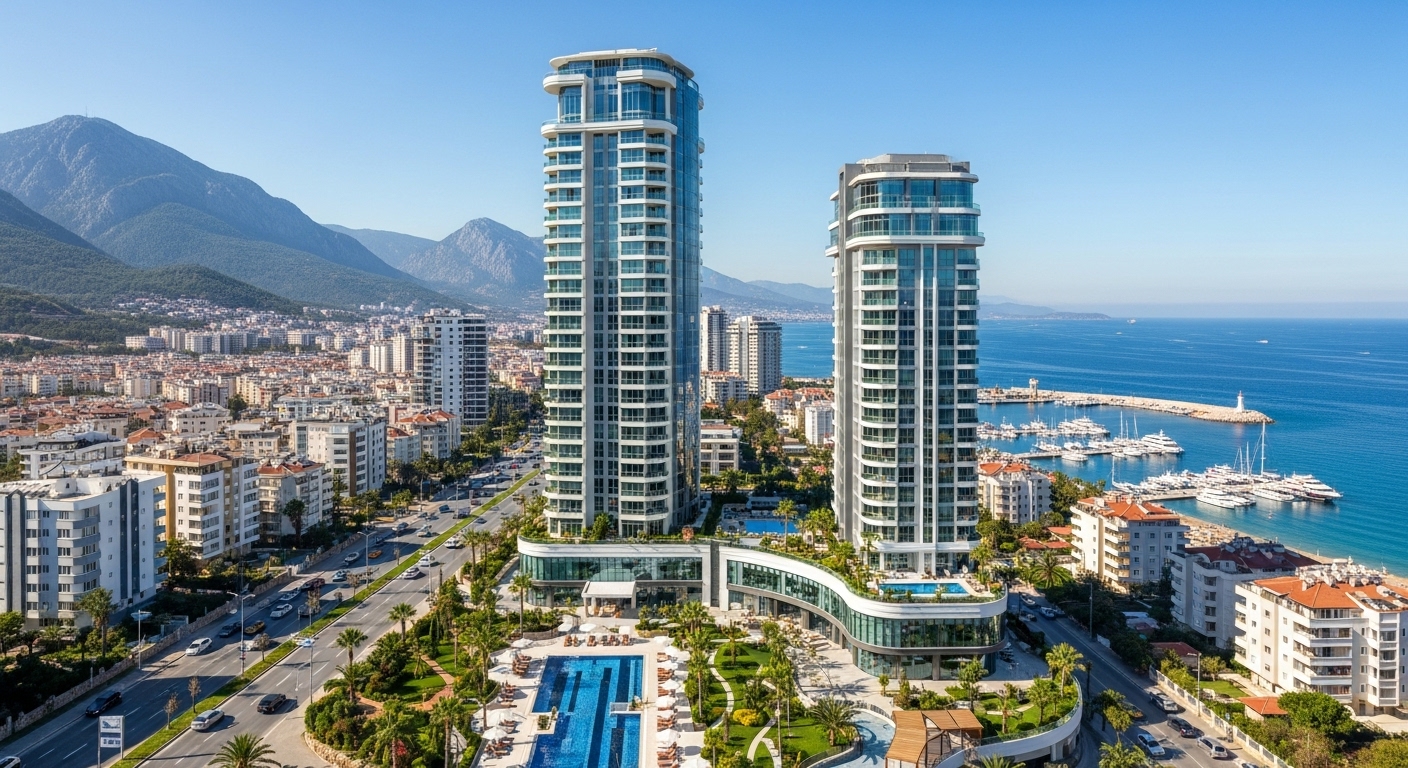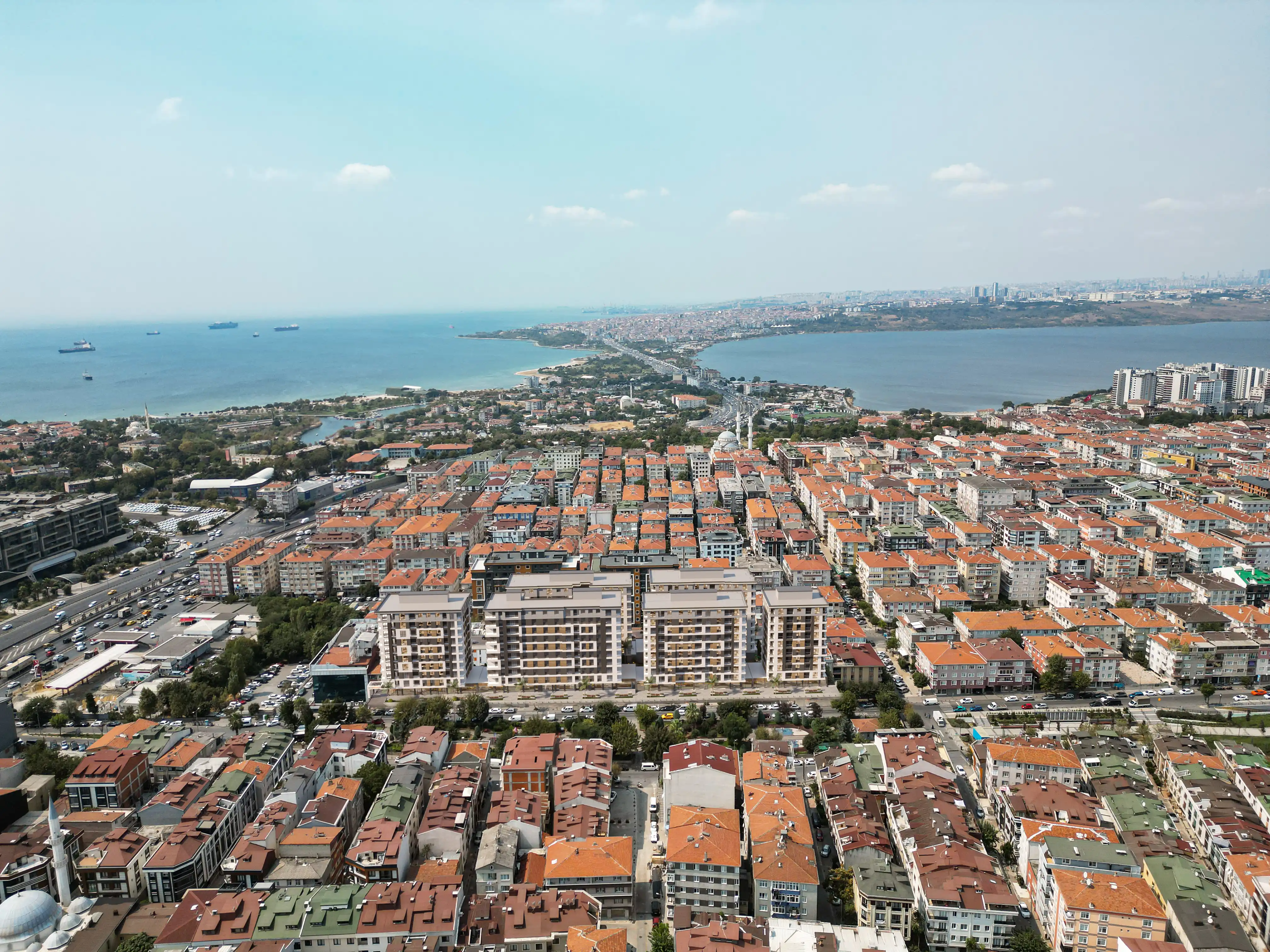Real Estate Investment in Turkey – The Complete 2025 Guide
Discover everything you need to know about real estate investment in Turkey, including top cities, ROI tips, legal steps, and property types.

Introduction to the Turkish Real Estate Market
Why Turkey? An Emerging Investment Hotspot
Turkey is no longer a secret in the world of real estate investment. Nestled between Europe and Asia, the country offers a compelling combination of geographical appeal, economic opportunity, and cultural richness. It's a place where modern skyscrapers rise beside ancient monuments, and cosmopolitan life thrives alongside traditional charm.
In recent years, foreign interest in Turkish real estate has skyrocketed, and it’s easy to understand why. With a stable housing market, affordable property prices compared to the EU, and a lifestyle that rivals the Mediterranean's finest, investors are eyeing Turkey for both short-term gains and long-term security. Cities like Istanbul, Antalya, and Ankara are now buzzing with residential and commercial development. Even lesser-known gems like Trabzon are becoming hotspots for international buyers seeking value and growth potential.
Plus, the Turkish government actively supports foreign investors. With citizenship-by-investment programs, reduced taxes, and residency incentives, the path to property ownership is smoother than ever. For anyone looking for high-yield opportunities, low-cost entry, and high appreciation potential, Turkey is the place to watch in 2025.
The Legal Framework for Foreign Investors
One of the biggest concerns for any investor is legality—and in Turkey, the government has made huge strides to streamline and secure the property acquisition process for foreigners. The reciprocity law enacted in 2012 opened the doors for citizens of over 180 countries to purchase property without needing Turkish residency.
The property buying process is straightforward but must be navigated with care. It includes checking land registry records, ensuring zoning compliance, and verifying the seller’s authority. Foreign buyers are protected by the same laws that apply to Turkish nationals, and ownership is secured by receiving a "Tapu"—a title deed recognized by the Land Registry and Cadastre Directorate.
Foreigners can own residential, commercial, and land properties—though some military zones and rural areas may have restrictions. It's also essential to work with a certified real estate agency or lawyer to avoid fraud and ensure compliance with local laws. This legal backbone gives confidence to investors entering Turkey’s dynamic market.
Economic and Strategic Reasons to Invest in Turkey
Turkey’s Booming Economy and Urban Expansion
Despite global economic turbulence, Turkey has demonstrated remarkable resilience. The country’s GDP continues to grow, supported by a thriving construction sector, tourism industry, and youthful population. More than half of Turkey’s population is under 32, creating high housing demand and a strong rental market—especially in metropolitan areas like Istanbul, Izmir, and Antalya.
Urban development is accelerating. Mega-projects like Istanbul Airport, Canal Istanbul, and the financial districts in Ataşehir and Levent are reshaping city skylines and boosting infrastructure. These investments are not just cosmetic—they enhance transportation, boost tourism, and increase real estate demand in surrounding areas.
For investors, this means continuous value appreciation. Properties purchased today often rise significantly in value within just a few years. Coupled with low entry costs and flexible payment plans, Turkey’s urban expansion offers a unique window for both conservative and aggressive investors.
Government Incentives and Citizenship Programs
One of Turkey's most attractive policies for international investors is the real estate-based citizenship program. As of 2025, foreigners can gain Turkish citizenship by investing at least $400,000 in real estate and holding it for three years. This makes it one of the most affordable and beneficial citizenship programs in the world.
But that’s not all. Other incentives include:
Tax exemptions for property buyers under specific conditions.
Reduced VAT on certain property types.
Automatic residence permits for buyers and their families.
Rental income tax reductions for foreign investors.
Additionally, free trade agreements with the EU, modern banking systems, and digital land registry access make the process fast and transparent. These incentives have turned Turkey into a top-tier investment destination—not just for property, but for future security and global mobility.
Best Cities for Real Estate Investment in Turkey
Istanbul – The Economic and Cultural Hub
When you think about real estate investment in Turkey, Istanbul is the first name that pops up—and for good reason. As the country’s largest city and financial heart, Istanbul blends East and West in a way no other city can. With a population nearing 20 million, it boasts a robust housing demand and countless neighborhoods catering to different investor profiles.
Whether you're into luxury Bosphorus villas, modern high-rise apartments in Maslak, or affordable suburban properties in Beylikdüzü, Istanbul has it all. The city’s infrastructure—metro lines, bridges, airports—keeps improving, and so does the ROI.
Rental yields in certain districts range between 5-8%, and capital appreciation can reach up to 25% annually in newly developed zones. This makes Istanbul ideal for both flipping and long-term rental investments.
Antalya – Coastal Luxury and High ROI
Antalya, known for its turquoise beaches and Mediterranean climate, isn’t just a tourist paradise—it’s a goldmine for property investors. Foreigners love Antalya for its relaxed lifestyle, luxurious resorts, and high rental demand from both tourists and expats. It’s a prime spot for buying summer homes or short-term rental properties.
The city offers a variety of investment options—from modern sea-view apartments to traditional villas nestled in olive groves. According to Deal Real Estate, Antalya has one of the highest occupancy rates for holiday rentals in Turkey. This ensures strong returns, especially during peak seasons when daily rental prices soar.
Trabzon – The Northern Gem for Affordable Properties
If you’re looking for untapped value, Trabzon should be on your radar. Located on the Black Sea coast, this city is gaining popularity among Middle Eastern and Gulf investors for its lush nature, peaceful lifestyle, and affordable property prices.
As highlighted by Deal Real Estate, Trabzon offers new residential complexes with modern amenities at a fraction of Istanbul’s cost. Whether you’re investing for personal use or rental income, Trabzon delivers significant ROI—particularly in summer when demand peaks.
The city’s development plan includes airport expansions, new roads, and tourism centers, which are already driving price increases in key districts.
Understanding Return on Investment (ROI) in Turkey
Rental Yields and Capital Growth Trends
When it comes to ROI, Turkey offers an enviable balance of affordability and profitability. Investors can expect gross rental yields ranging from 4% to 10%, depending on the property's location, type, and quality. Cities like Istanbul and Antalya lead the way, not just in rental income but also in long-term capital growth.
According to Deal Real Estate, properties near transport hubs, shopping centers, or in urban regeneration zones tend to appreciate rapidly. For instance, areas such as Başakşehir, Kadıköy, and Beşiktaş in Istanbul have witnessed double-digit growth annually due to new developments and increased demand.
In holiday hotspots like Bodrum or Antalya, short-term rentals through platforms like Airbnb and Booking.com yield even higher returns during peak seasons. This dual potential—monthly rental income plus long-term value growth—makes Turkish real estate a winning bet for both passive income seekers and strategic investors.
But remember, ROI isn’t just about numbers. It’s also about timing and vision. Buying into emerging areas or pre-construction projects can amplify your returns by 20% or more within a few years. This is where local expertise comes in handy, so always work with a trusted agency familiar with ROI data and trends.
Neighborhood Analysis and Property Value Appreciation
Every city has its rising stars—districts poised for transformation. In Turkey, knowing which neighborhoods are under development or part of an urban renewal initiative can dramatically affect your investment outcome.
For instance:
Istanbul’s Esenyurt: Once a budget district, now a hotspot for new families and expats due to shopping malls and metro connections.
Antalya’s Konyaaltı: Experiencing a construction boom and higher tourism traffic, leading to rapid property value hikes.
Trabzon’s Yomra: Popular with Gulf investors for its greenery and new apartment complexes, pushing up demand and prices.
By aligning your investment with upcoming infrastructure projects—like new airports, tunnels, or commercial hubs—you can ride the wave of appreciation. These micro-trends often result in 30-50% value increases over three to five years.
Thorough neighborhood analysis isn’t optional—it’s critical. Investigate proximity to schools, hospitals, shopping centers, and parks. Properties with sea views, corner plots, or those near planned metro lines always command higher resale prices.
Step-by-Step Process to Buying Real Estate in Turkey
Choosing the Right Real Estate Agency
This is perhaps the most critical step in the buying journey. The difference between a stress-free purchase and a legal nightmare often comes down to who you’re working with. A certified, transparent, and experienced agency will not only protect your interests but also guide you through the maze of Turkish real estate laws.
Deal Real Estate is a trusted name in this space. They offer end-to-end services, including legal support, notary translations, after-sales management, and even furniture assistance. More importantly, they understand the local market dynamics, pricing fluctuations, and the art of negotiation.
Before signing anything:
Check if the agency is registered with the Chamber of Commerce.
Ask for previous client testimonials.
Ensure they have an in-house legal team or partners.
Visit their office to validate legitimacy.
A good agency becomes your eyes, ears, and advocate in Turkey—especially if you’re investing remotely or for the first time.
Legal Documentation and Property Title Deed Transfer
After finding your dream property, it’s time to get legal. The first document is the sales agreement, which outlines the property details, price, deposit, and transfer timeline. It’s typically signed in both English and Turkish to avoid confusion.
Next comes the due diligence—your lawyer or agent must verify the property’s title, check for debts or encumbrances, and ensure it’s zoned for construction. Once cleared, the seller and buyer sign the official transfer at the Land Registry Office. The new Tapu (title deed) is issued in your name within a few days.
Fees involved include:
Title deed tax (usually 4% of the property value).
Notary and translation fees.
Lawyer fees (optional but recommended).
Note: Non-Turkish speakers must have a certified translator present during the Tapu registration.
Financing Options and Mortgage Availability
Financing real estate in Turkey is surprisingly accessible. Although cash payments dominate the market, Turkish banks do offer mortgages to foreigners—provided they meet certain conditions.
Key points:
Mortgage terms range from 1 to 15 years.
Loan-to-value ratio: up to 50% for foreign buyers.
Required documents: passport, income proof, Turkish tax number, and credit history.
Interest rates vary but are generally higher than in Europe.
Many developers also offer in-house installment plans—no interest, no bank, and flexible terms. These are especially common in off-plan or newly constructed apartments. A typical plan might include a 30% down payment and the rest paid over 24 to 60 months.
If you're buying for investment, financing can boost your ROI by letting your rental income cover the loan while your property value appreciates.
Types of Real Estate Investment Opportunities
Residential Apartments and Villas
Turkey’s residential market is incredibly diverse. From compact city-center apartments to luxury seafront villas, there's something for every investor type and budget. Residential properties are the most popular choice for foreigners—especially those looking to generate rental income or gain citizenship through real estate.
Why choose residential?
High rental demand from locals, expats, and students.
Tax benefits and easy resale potential.
Citizenship eligibility if property value exceeds $400,000.
Apartments in Istanbul, villas in Bodrum, and penthouses in Antalya each offer different rental yield profiles. Most new residential projects come with amenities like gyms, pools, security, and concierge services—adding value for both renters and buyers.
For those seeking long-term passive income, residential units near universities, hospitals, and business centers are top picks.
Commercial Properties and Office Spaces
If you're after higher ROI and long leases, commercial property is the way to go. Turkey’s booming business scene has created growing demand for retail shops, cafes, restaurants, and office buildings—especially in urban districts like Levent, Şişli, and Kartal in Istanbul.
Commercial units generally offer:
Longer lease terms (3–10 years).
Higher returns (8–12% annually).
Stable tenants like banks, chains, or offices.
However, commercial real estate comes with higher entry costs and requires deeper market analysis. You'll need to consider foot traffic, zoning laws, tenant reliability, and location. But for savvy investors, the potential upside is unmatched.
Land Investment and Development Projects
Land is the most speculative yet potentially rewarding type of investment in Turkey. Buying land in developing zones or near planned infrastructure projects can deliver exponential gains.
Key tips:
Ensure the land is registered and zoned for construction.
Watch out for protected zones (forests, military).
Seek expert legal and urban planning advice.
Some investors buy agricultural land, convert it into villa complexes, or wait for municipal development projects to raise land value. While it's riskier, land investment can yield 2x to 5x returns in a few years if done wisely.
A Guide to Safe Real Estate Investment in Turkey
Due Diligence and Fraud Prevention
Investing in a foreign country can be thrilling—but it can also be a legal and financial minefield if you skip your homework. Turkey has made significant progress in real estate transparency, but like any booming market, it's not immune to scams, shady developers, or misleading listings.
Start with due diligence:
Verify the developer's background. Are they reputable? Have they delivered past projects on time?
Check the title deed (Tapu) for ownership history, debts, and zoning.
Inspect building licenses and occupancy permits, especially for new constructions.
Avoid cash transactions without legal documentation.
The golden rule? Don’t go solo. Work with certified lawyers, government-registered agencies, and experienced realtors. Agencies like Deal Real Estate not only guide you through the legal maze but also protect your investment from pitfalls that first-time buyers often miss.
Also, beware of common traps:
Unrealistic prices: If it’s too good to be true, it probably is.
“Guaranteed rent” scams with no written contract.
Projects without permits or with shared ownership claims.
Being cautious doesn’t mean being paranoid—it means protecting your future.
Working with Certified Real Estate Agencies
A good agency can make or break your investment. Look for companies that:
Are registered with Turkish authorities and local chambers.
Offer bilingual support (especially English and Arabic).
Have in-house legal teams or partnerships with vetted lawyers.
Provide transparent pricing and full after-sale services.
Agencies like Deal Real Estate have built a strong reputation for ethical practices and investor-friendly services. They’ll help you find the best property for your goals—be it rental income, capital gains, or citizenship.
Always insist on seeing documents, visiting properties in person (or virtually), and signing bilingual contracts. Don’t rely solely on photos or verbal promises. A professional agency will handle everything from property tours to notarizing paperwork—and even furnishing your home.
Investing for Rental Income in Turkey
How to Buy Rental Property in Turkey
Rental property is one of the smartest plays in Turkish real estate. With millions of tourists, university students, and digital nomads flooding the country, demand for rentals—especially furnished units—is sky-high.
Deal Real Estate’s rental guide offers a full breakdown, but here are the essentials:
Target the right cities. Istanbul, Antalya, and Izmir have the best rental markets.
Understand your audience. Tourists need short-term rentals near attractions. Expats prefer long-term leases in quiet, upscale neighborhoods.
Choose furnished over unfurnished. Furnished units rent faster and at higher prices.
Set up a property management plan. Hire local firms to handle tenants, repairs, and maintenance if you don’t live in Turkey.
Short-term rentals, especially on platforms like Airbnb or Booking.com, can deliver massive profits during peak tourist months. But be aware of local regulations on daily rentals—some municipalities require licensing or approval from building management.
Short-Term vs Long-Term Rental Markets
This choice comes down to strategy. Are you chasing high monthly yields with more tenant turnover? Or do you want steady income with less hassle?
Short-Term Rentals:
Pros: Higher nightly rates, especially in tourist cities.
Cons: Seasonal income, more maintenance, stricter laws in some cities.
Long-Term Rentals:
Pros: Stable income, less property wear-and-tear, longer tenant contracts.
Cons: Lower monthly yield, slower ROI in some districts.
Cities like Antalya or Bodrum are perfect for short-term rentals, while Istanbul’s business districts and suburbs cater to long-term tenants like students and working professionals.
Legal and Tax Implications
Property Taxes and Inheritance Laws
Understanding Turkey’s tax structure can help you plan better and avoid surprises. Here's what to expect:
Buying Taxes:
Title deed transfer tax: 4% of the declared property value (usually shared 50/50 between buyer and seller, but negotiable).
VAT: Usually 1%-18%, though foreigners often get exemptions.
Ongoing Taxes:
Annual property tax: Ranges from 0.1% to 0.6%, depending on property type and location.
Rental income tax: Starts from 15% and scales up, but deductible expenses like maintenance and management can reduce taxable income.
Inheritance laws in Turkey apply to all property owners—foreigners included. Turkey doesn’t have a punitive estate tax, and your legal heirs can inherit your property, though it’s wise to prepare a Turkish will to avoid complications.
Hiring a local accountant is highly recommended to manage tax filings and ensure compliance. Avoid fines and protect your returns by staying informed.
Visa, Residency, and Citizenship through Investment
Turkey offers a clear path from property ownership to long-term residency—and even full citizenship. Here’s how:
Residency Permit:
Anyone who owns property in Turkey is eligible for a 1-year renewable residence permit.
You can renew this permit as long as you maintain ownership.
Citizenship by Investment:
Minimum investment: $400,000 in real estate.
Property must be held for at least 3 years.
Process takes 3 to 6 months and includes spouse and children under 18.
No Turkish language or residency requirement.
This dual benefit—real estate + second passport—makes Turkey an incredible opportunity for investors looking to expand their global footprint.
Challenges and Risks of Investing in Turkey
Market Volatility and Currency Fluctuations
While the Turkish market is lucrative, it's not without risks. One of the biggest challenges is the volatile Turkish lira. While a weak lira attracts foreign investors due to better exchange rates, it also affects construction costs and developer pricing.
Another issue is inflation—while it can drive property appreciation, it also increases maintenance and utility expenses. Investors need to factor in these costs when calculating ROI.
Currency hedging or buying in USD-pegged zones (like luxury developments in Istanbul) can minimize this risk. Additionally, diversifying your investment across several units or cities can buffer against market shocks.
Navigating Bureaucracy and Local Regulations
Turkey has simplified much of its property-buying process, but bureaucracy still lingers. Foreigners may face delays in document translation, TAPU registration, or banking approvals.
Tips to overcome red tape:
Use bilingual legal professionals.
Get a Turkish tax number early.
Open a local bank account for smoother transactions.
Understand local bylaws, especially in multi-unit buildings (some don’t allow short-term rentals or renovations).
Despite these hiccups, most of these challenges are manageable with the right team. And the rewards often far outweigh the initial hurdles.
Tips for First-Time Foreign Investors
Partnering with Local Experts
Your network is your net worth—especially in foreign real estate. Local agents, lawyers, and accountants can be the difference between a smooth transaction and an expensive mistake.
What to look for:
Agencies with multilingual staff.
Transparency in commission structures.
Access to off-market properties and developer discounts.
Services that extend beyond the sale (utility setup, rentals, resale assistance).
Turkish property culture is relationship-driven. A strong local partner can negotiate better prices, flag hidden issues, and help you comply with evolving regulations.
Visiting Properties and Negotiating Deals
Photos are great—but nothing beats boots on the ground. If possible, take a short trip to Turkey to view shortlisted properties in person. This gives you a sense of the neighborhood, developer quality, and potential red flags.
Don’t shy away from negotiating. In Turkey, price haggling is expected. Developers often leave room for discounts, free appliances, or flexible payment plans—especially on new projects or bulk purchases.
Remember:
Come prepared with a lawyer and translator.
Always ask for a TAPU (title deed) preview.
Don’t rush. Take time to compare options.
Success Stories and Testimonials
Real-Life Experiences from Global Investors
Success in real estate isn’t just about statistics—it’s about stories. Many foreign investors have found Turkey to be a goldmine for growth, income, and even a new lifestyle. From Middle Eastern entrepreneurs buying luxury villas in Bodrum, to European retirees settling in Antalya, the country is filled with inspiring tales of property transformation.
One investor from Germany shared how he bought a two-bedroom apartment in Istanbul's Basin Express district for $120,000 in 2018. By 2023, the property's value had more than doubled thanks to infrastructure development and business migration into the area. On top of that, he earned steady rental income, covering his mortgage entirely.
Another success story comes from a Kuwaiti investor who purchased three apartments in Antalya. By leveraging holiday rental platforms, he tripled his income during the summer season and even managed to pay off one unit early with profits.
These experiences show that with the right research, timing, and professional support, Turkey can turn into a real estate haven for global investors.
Case Studies: ROI Achievements and Property Upgrades
Let’s break down a few case studies that highlight the powerful returns Turkish real estate can offer:
Case Study 1: Istanbul – Buy and Hold Strategy
Initial Investment: $150,000 in 2020
Property Type: 2-bedroom apartment in Zeytinburnu
Current Value (2025): $280,000
Annual Rental Income: $10,000
Total ROI in 5 years: Over 90% appreciation + rental income
Case Study 2: Antalya – Holiday Rental Strategy
Initial Investment: $100,000 in 2021
Property Type: Furnished sea-view apartment in Konyaaltı
Seasonal Rental Income: $15,000 annually
Occupancy Rate: 85%
ROI in 4 years: Approximately 60% from rental + 30% appreciation
Case Study 3: Trabzon – Budget Investor
Initial Investment: $65,000 in 2022
Property Type: 1-bedroom apartment in Yomra
Rental Income: $400/month
ROI in 3 years: 25% appreciation + $14,400 rental income
These examples reflect what’s possible when investors align their goals with location trends and market timing.
Conclusion
Real estate investment in Turkey is more than a trend—it’s a strategic opportunity. From Istanbul’s fast-paced urban sprawl to Antalya’s tranquil beaches and Trabzon’s green landscapes, there’s something for every investor. Add to that the Turkish government's investment-friendly policies, flexible financing, and the possibility of citizenship, and you’re looking at one of the most attractive property markets in the world.
But success isn’t automatic. You need to understand the market, assess the risks, and build the right team around you. Whether you’re looking to flip properties, generate passive income, or secure a second passport, Turkey provides a solid foundation for growth.
Invest smart, act cautiously, and don’t skip professional advice. If you do it right, your Turkish investment could be the best decision of your financial life.
Ready to Invest in Turkish Real Estate? Let’s Make It Happen!
Whether you're seeking citizenship, high rental income, or long-term capital growth, Turkey’s real estate market has something for you. Don’t wait for the market to peak—start your property journey now with trusted experts by your side.
✅ Expert Legal Support
✅ Investment Guidance Tailored to Your Goals
✅ End-to-End Property Purchase Assistance
✅ Citizenship-by-Investment Made Easy
Get in touch today and unlock your future in Turkey!
👉 Contact Deal Real Estate Now or schedule your FREE consultation.
FAQs
Is buying property in Turkey safe for foreigners?
Yes, Turkey has a clear and secure property ownership system for foreigners. As long as you conduct due diligence, work with certified professionals, and verify legal documentation, the process is safe and protected under Turkish law.
Can foreigners own land in Turkey?
Foreigners can purchase land in Turkey as long as it’s not located in military or restricted zones. It’s essential to verify zoning status and construction rights before purchase.
How do I get Turkish citizenship through real estate?
You can obtain Turkish citizenship by investing a minimum of $400,000 in real estate and committing to hold the property for at least three years. The application process takes 3 to 6 months and includes family members.
What are the best places to invest in Turkish property?
Top cities for real estate investment include Istanbul, Antalya, Izmir, and Trabzon. Each offers different advantages depending on your goals—be it rental yield, capital appreciation, or lifestyle.
How can I find a trustworthy real estate agency in Turkey?
Look for agencies registered with Turkish authorities, with multilingual staff, a strong track record, and transparent contracts. Agencies like Deal Real Estate provide reliable, investor-focused services.
Have Question Or Suggestion ?
Please Share Your Thought, To Make It Real















